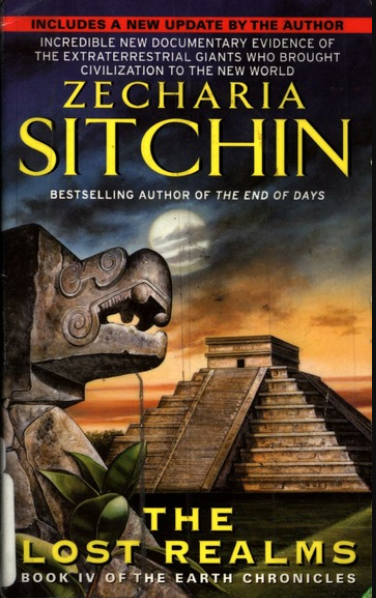Posted: May 7, 2023
The Lost Realms

Spoilers ahead.
It is with pleasure that I report that "The Lost Realms" did not begin with the clunkiness of book 2 and 3 of this series. Nor did it go into over-long retellings from the previous books. Structurally, it has a cohesion that equals that of "The 12th Planet".
The best thing about this book is that it expands on Sitchin's subject matter. "The Stairway to Heaven" and "The Wars of Gods and Men" deepened our knowledge of the subject matter introduced in "The 12th Planet"; "The Lost Realms" expands that subject matter by including a new area of the world: Mesoamerica and South America.
The book begins with a detailed description of the Spanish conquest of the New World. I recently read an article about a Mexican President sending a letter to the King of Spain asking the King to apologize for the genocides and atrocities perpetrated by the Spanish on the peoples of Mexico during Spain's colonial period. Based on what I have read in this book the Spaniards were ruthless, brutish, and totally uncivilized towards the denizens of Mexico, Peru, and what is now Bolivia and Ecuador. The killings and enslavery are the main thing but another aspect is the destruction of entire cultures and the theft of their property.
It's a harrowing read but Sitchin's main point here is that, one, a massive amount of gold was looted by Spain from the New World, and two, the inhabitants of the New World didn't have metallurgical or mining knowledge beyond placer mining. So the question arises: Where did all these gold come from?
When queried the natives would inevitably answer: from the gods.
With that enigmatic statement Sitchin begins to form tha argument that these "gods" the natives are speaking of are the ones that have been the subject of the series since book one: The Sumerian Gods. Or, rather, the Sumerian gods in their guise as Egyptian gods, moving to South America, and being regarded as the gods of the people of that vicinity. Specifically Thoth, brother of Marduk. He was the one the natives call Veracocha or Quetzacoatl - the god who gave them many things including the gold.
One of the most fascinating things discussed in the book are the Olmecs. These are Africans who lived a long time in South America and then disappeared. Leaving only their stonework as testament to their existence. What happened to them? Sitchin informs us that they came to South America with the Sumerians, they built great cities and processing plants but ultimately they and the Sumerians met a violent end that apparently annihilated them. Nonetheless, the Olmec culture is a major influencer for all the other cultures that followed them.
I am also very admiring of a historical character mentioned in the book. One Polansky, an engineer who dedicated his life to learning of the ancient history around the Tiutihuacan area in Ecuador. This guy was so thorough that all subsequent studies on the subject is pretty much based on his study. At one point in the book he dated a particular ancient gateway as coming from before the Deluge! unfortunately scientific consternation at this announcement has the timeframe being moved down to a post-Deluvial date. Still. what if right? We have an actual structure on Earth that survived the Flood together with the Baalbek foundation mentioned in "Stairway to Heaven".
Speaking of the Flood, this too is part of the ancient stories of the people in Mesoamerica and South America. These ancient peoples are the Aztecs of Mexico (who really call themselves Mexica), the Inca of Peru, and the Maya of the eastern parts of the continent.
There is one other race memory among these peoples: a prolonged day of darkness. Now this is tantalizing. Sitchin manages to link this incident with the prolonged daylight that the Israelites experienced as recounted in the Old Testament. Since South America is in the other side of the world this would have been experienced as an extended nighttime. I've always been a skeptic of that particular incident in the Bible; I mean, how coould the sun stop in the sky? Sitchin says that a possible explanation was a comet disintegration could have temporarily retarded the Earths spin. I don't know, I really don't know.
Anyway, back to that link between Mesopotamia and South America. According to Sitchin, the production of bronze nearly came to a halt in Mesopotamia around the third century B.C.E. because they were running out of tin. Tin with copper is used to make bronze. At this time the family of Enlil and Enki were at war; as recounted in "The Wars of Gods and Men". Because of this strife, Thoth took a contingent to South America were they initially discovered vast gold reserves. When they started mining the gold they also came upon the long sought for tin. Tiutihuacan, as Sitchin explains, is a tin processing plant. The whole incident started the legends of the gods as remembered by the Inca, Maya, and Aztecs (Mexica).
I really appreciate the expansion of the history brought about by this book. As usual, Sitchin is extremely detailed. He really nerds out on this stuff and I love it. I am in awe of the discussions concerning calendars and solstices and such because it is far above me I can't really grasp it; but I understand enough to be impressed and fascinated. I'm really looking forward to what's next in the series.